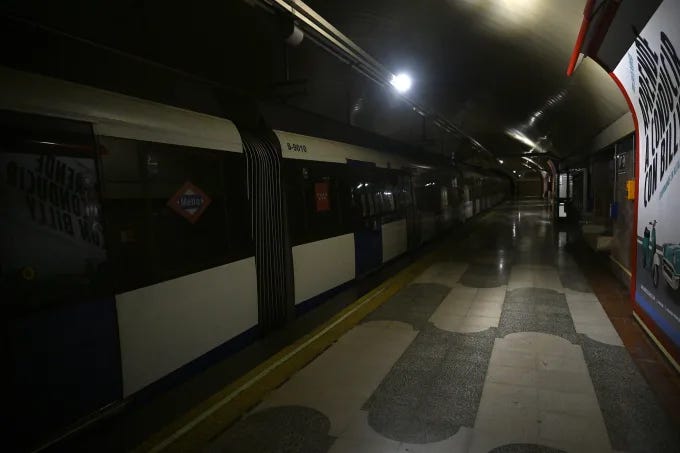On April 28, 2025, the lights went out across Spain and Portugal, and the future collapsed in on itself with the quiet horror of a man realizing he’s been buried alive. Electricity — the invisible lifeline binding 60 million lives to safety, sanity, and survival — simply vanished. Traffic lights blinked out. Airports froze mid-departure. Madrid, Lisbon, Barcelona, Seville — all reduced to static husks in a matter of minutes.
For a few surreal hours, the myth of progress peeled away like cheap paint. Cash replaced cards, candles replaced hospitals, and government “contingency plans” — long lauded in press conferences — curled up and died somewhere in the dust behind the Ministry of Transport. It didn’t take days. It didn’t even take hours. It took five minutes for reality to buckle.
Because the ugly truth is this: Modern civilization is a ghost story powered by electricity. And the moment the current decides to go home, the living world goes with it.
People like to believe we are evolved, logical creatures. But when the current fails, we become what we always were — animals armed with credit cards and bad habits, locked out of the cage we mistook for a kingdom. The first blackout will be temporary. The second will be final. And if today taught us anything, it’s that we won’t survive the long night when the grid forgets to come back.
It starts small.
One minute you’re leaning against a plastic chair in a Madrid airport, thinking about lunch. The next, the lights cough once and the world drops into silence, thick as wet wool. Phones die mid-scroll. Card readers blink dumbly. The smell of scorched wires crawls up your nose.
At first, it’s funny. Novel, even. A tourist tries to Venmo a cab driver three hundred euros for a ride, but the driver just shrugs and disappears into the growing crowd. A businessman waves cash at a vending machine like it might change its mind. Someone jokes about “going medieval.” And then the jokes die.
The metro station goes black. Passengers start filtering out like ants fumbling for sunlight. A woman sobs at a locked ticket machine. A boy pickpockets her while she fights it. Nobody intervenes. Nobody cares. The rules are changing. Fast.
Hospitals fall onto backup generators not built to carry the load. Emergency rooms hemorrhage patients like gutted ships losing cargo. Somewhere across town, a surgeon finishes an appendectomy by flashlight, muttering Hail Marys under his breath.
The air changes. It’s not just hot — it’s electric, alive, buzzing in your teeth. Every surface shocks you when you touch it. Your hair stands up as if waiting for the end. Even the shadows look meaner.
You realize the power didn’t just leave — it mutinied. It abandoned you, and it’s not coming back because it never owed you anything.
Without the hum of electricity keeping the monsters at bay, the old instincts come roaring back: fight, flee, freeze. The hospitals are out. The grocery stores are closing. And there are far too many people between you and the last gallon of clean water.
By nightfall, the city looks less like a civilization and more like a carcass picked clean by rats. The darkness isn’t passive. It isn’t patient. It’s hunting you.
You built your life on faith in a wire. You wired your heart, your health, your future to a system so fragile it whines when a crow farts on the wrong transformer. And now you’re standing in the ruins of your own stupidity, clutching a dead cell phone like a rosary and wondering where it all went wrong.
It didn’t go wrong today. It was wrong the whole time. You just didn’t notice until the hum stopped.
The current wants to go home. And when it finally does, so will we — crawling backward into the dark.
Not as kings.
Not as engineers.
Not as citizens.
But as animals.
Just animals.
Waiting for the last light to die.
The future isn’t guaranteed. Neither is the truth. Subscribe today.
This post has been syndicated from Closer to the Edge, where it was published under this address.

